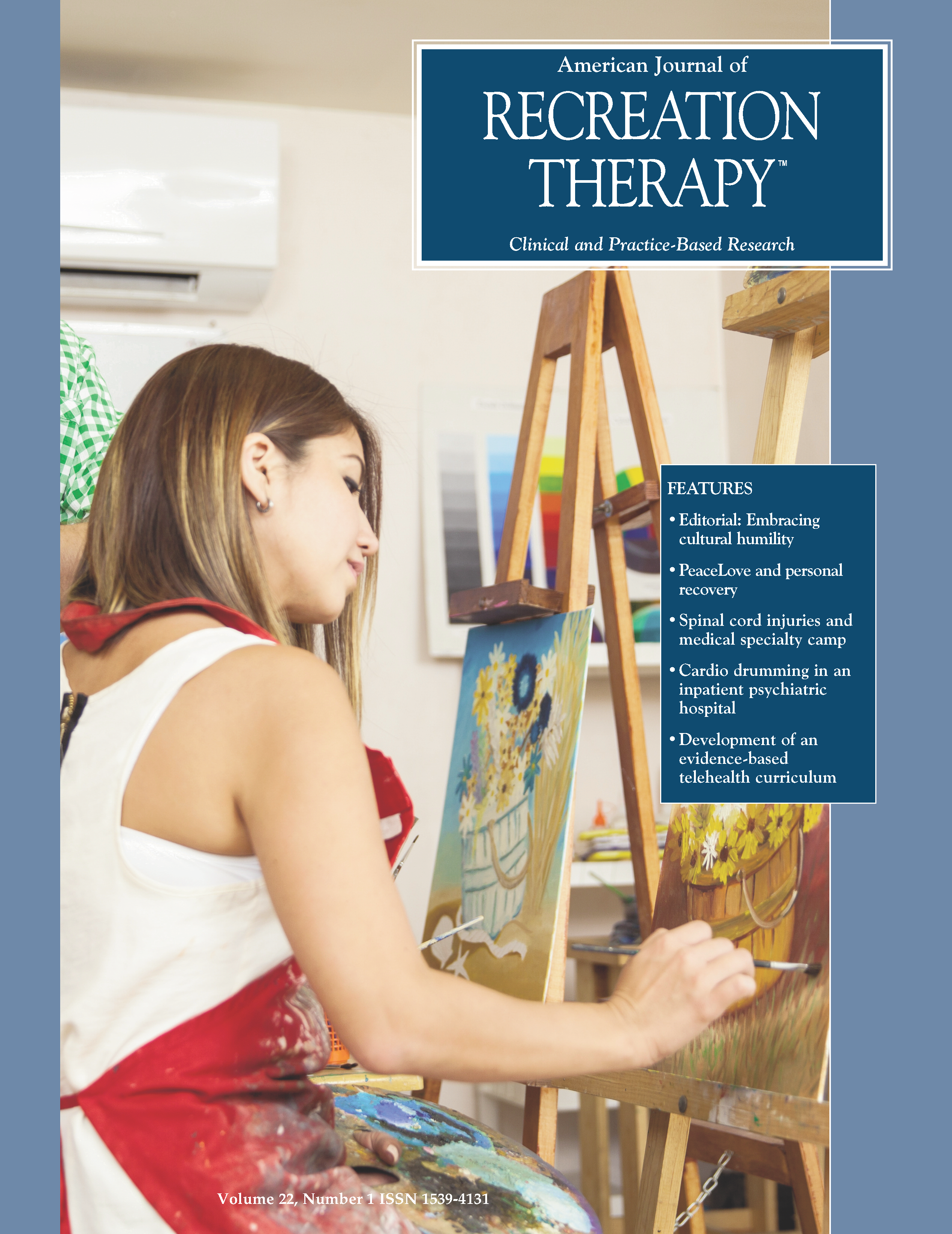Development of an evidence-based telehealth curriculum to increase happiness for older adults in long-term care: A therapeutic recreation concept design
DOI:
https://doi.org/10.5055/ajrt.2023.0278Keywords:
evidence-based practice, older adults, happiness, positive psychology, intergenerational service-learning, COVID-19, telehealthAbstract
Older adults are at higher risk for isolation, loneliness, and depression. The University of Wisconsin-La Crosse (UWL) Happiness Project: Evidence-Based Curriculum for Older Adults is designed to empower older adults in long-term care to increase happiness in their everyday lives. This curriculum is designed to implement a virtual, intergenerational service-learning in long-term care facilities to provide students applied experience working with older adults. The UWL Happiness Project is a 10-week, evidence-based curriculum grounded in positive psychology and utilizes the PERMA Model, a theory of well-being. It consists of ten 30-minute telehealth meetings with a university student (using a 1:1 format) enrolled in a therapeutic recreation (TR) elective course focusing on older adults. Sessions include a focus area each week related to increasing resident’s overall happiness. Scaffolding is used to build residents’ knowledge about happiness and encourage continuous implementation of the skills learned during as well as after the curriculum is finished, ultimately working toward the resident putting the information and happiness strategies into practice independently. All session protocols, theoretical foundation, and assessments can be found in the curriculum fidelity manual that is available open access on the UWL TR webpage.
References
Hawley C, Genovese N, Owsiany M, et al.: Rapid integration of home telehealth visits amidst COVID-19: What do older adults need to succeed? J Am Geriatr Soc. 2020; 68(11): 2431-2439.
Office E, Rodenstein M, Merchant T, et al.: Reducing social isolation of seniors during COVID-19 through medical student telephone contact. J Post Acute Long-Term Care Med. 2020; 21(7): 948-950. DOI: 10.1016/j.jamda.2020.06.003.
Rubin G: The Happiness Project. New York, NY: HarperCollins, 2012.
Bouffard M, Reid G: The good, the bad, and the ugly of evidence- based practice 1. Adapt Phys Activ Q. 2012; 29(1): 1-24.
Duncan J, Killian T, Lucier-Greer M: Leisure, relatedness, and ill-being among older adults in long-term care. Act Adapt Aging. 2017; 41(4): 273-290. DOI: 10.1080/01924788.2017.1326764.
Wu B: Social isolation and loneliness among older adults in the context of COVID-19: A global challenge. Glob Health Res Policy. 2020; 5(27). DOI: 10.1186/s41256-020-00154-3.
HealthIT.gov: Office of the national coordinator for health information technology (ONC). Frequently asked questions. Available at https://www.healthit.gov/faq/what-telehealthhow-telehealth-different-telemedicine#:~:text=While%20telemedicine%20refers%20specifically%20to,in%20addition%20to%20clinical%20services. Accessed April 10, 2022.
University of Pennsylvania: PERMA™ Theory of Well-Being and PERMA™ Workshops | Positive Psychology Center. Available at https://ppc.sas.upenn.edu/learn-more/perma-theory-well-being-and-perma-workshops. Accessed May 2, 2021.
Barbosa Neves B, Sanders A, Kokanovic R: “It’s the worst bloody feeling in the world”: Experiences of loneliness and social isolation among older people living in care homes. J Aging Stud. 2019; 49: 74-84. DOI: 10.1016/j.jaging.2019.100785.
Ho H, Yeung D, Kwok S: Development and evaluation of the positive psychology intervention for older adults. J Posit Psychol. 2014; 9(3): 187-197. DOI: 10.1080/17439760.2014.888577.
Hoffman G, Webster N, Brynum JPW: A framework for aging-friendly services and supports in the age of COVID-19. J Aging Soc Policy. 2020; 32(4-5): 450-459. DOI: 10.1080/08959420.2020.1771239.
Blais S, McCleary L, Garcia L, et al.: Examining the benefits of intergenerational volunteering in long-term care: A review of the literature. J Intergenerational Relatsh. 2017; 15(3): 258-272. DOI: 10.1080/15350770.2017.1330056.
Borrero L: Intergenerational service learning: Bringing together undergraduate students and older adult learners to engage in collaborative research. J Intergenerational Relatsh. 2015; 13(2): 188-192. DOI: 10.1080/15350770.2015.1025679.
June A, Andreoletti C: Participation in intergenerational service-learning benefits older adults: A brief report. Gerontol Geriatr Educ. 2020; 41(2): 169-174. DOI: 10.1080/02701960.2018.1457529.
Zucchero RA, Gibson JE: A comparison of intergenerational service learning and traditional pedagogy among undergraduate psychology students. Psychol Learn Teach. 2019; 18(2): 179-196. DOI: 10.1177/1475725718823970.
Augustin F, Freshman B: The effects of service-learning on college students’ attitudes toward older adults. Gerontol Geriatr Educ. 2016; 37(2): 123-144.
Obhi HK, Woodhead EL: Attitudes and experiences with older adults: A case for service learning for undergraduates. Gerontol Geriatr Educ. 2016; 37(2): 108-122. DOI: 10.1080/02701960.2015.1079704.
Xu H, Intrator O, Bowblis JR: Shortages of staff in nursing homes during the COVID-19 pandemic: What are the driving factors? J Am Med Dir Assoc. 2020; 21(10): 1371-1377. DOI: 10.1016/j.jamda.2020.08.002.
Thomas KS, Dosa D, Wysocki A, et al.: The minimum data set 3.0 cognitive function scale. Med Care. 2017; 55(9): e68-e72. DOI: 10.1097/MLR.0000000000000334.
Subjective Happiness Scale (SHS): Available at http://sonjalyubomirsky.com/subjective-happiness-scale-shs/. Accessed May 2, 2021.
Zager Kocjan G, Jose PE, Socˇan G, et al.: Measurement invariance of the subjective happiness scale across countries, gender, age, and time. Assessment. 2022; 29: 826-841. DOI: 10.1177/1073191121993558.
Lyubomirsky S, Lepper HS: A measure of subjective happiness: Preliminary reliability and construct validation. Soc Indic Res 1999; 46: 137-155.
Questionnaire for Assessing the Impact of the COVID-19 Pandemic and Accompanying Mitigation Efforts on Older Adults (QAICPOA): Available at https://www.qiacpoa.com. Accessed May 2, 2021.
Intrieri RC, von Eye A, Kelly JA: The aging semantic differential: A confirmatory factor analysis. Gerontologist. 1995; 35(5): 616-621. DOI: 10.1093/geront/35.5.616.
Andreoletti C, Howard JL: Bridging the generation gap: Intergenerational service-learning benefits young and old. Gerontol Geriatr Educ. 2018; 39(1): 46-60. DOI: 10.1080/02701960.2016.1152266.
Story KM, Flanagan ME, Brown HA, et al.: Veterans hospital administration telehealth utilization for recreation and creative arts therapies: A brief report. Telemed e-Health. 2022; 28(5): 752-757.
Published
How to Cite
Issue
Section
License
Copyright 2000-2025, Weston Medical Publishing, LLC and American Journal of Recreation Therapy. All Rights Reserved.


